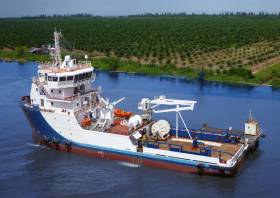Displaying items by tag: Mainport Pine
Second Seismic Ship Makes Maiden Irish Port of Call to Owners 'Mainport' Homeport
#CorkHarbour - An unusually high concentration of Mainport Group vessels among them a seismic-survey ship made a maiden Irish port of call to her owners homeport of Cork Harbour this morning, writes Jehan Ashmore.
Afloat had monitored the arrival of Mainport Pine, the most modern of the Cork based company fleet that docked just before 09.30hrs. Mainport Pine of 1,659 gross tonnage was delivered in 2014 and is the second of a pair of commissioned Malaysian built seismic-survey vessels.
These high-tech sophisticated vessels collect information about the subsea and so are vital for the oil and gas industry. The pair are used on the charter market by the exploration /energy companies.
Almost a year ago Afloat reported on sister Mainport Cedar completed in 2013, had previously also made a homecoming debut to Cork. At the time the vessel was undergoing maintenance in between a repositioning voyage that led to a contract for the oil industry based in the Gulf of Mexico.
Mainport Pine had departed Bergen, Norway and Afloat yesterday had also tracked the ship while offshore of Wicklow Head when bound for Cork. It was at the city's central quays that this morning saw the ship berth astern of a fleetmate, Mainport Kells. This seismic-chase vessel is designed to intercept any approaching vessels which could damage cables being towed or installed on the seabed.
The pair are togther berthed at North Custom House Quay.
Downriver one of Mainport's tugs Celtic Isle which in recent years was transferred from Shannon Estuary operations at the Port of Foynes, is berthed at Cork Dockyard.
Asides towage duties, Celtic Isle is employed on serving the requirements of the Kinsale Gas Field along with Ocean Spey which was acquired last year. This standby and supply vessel with handling handling capacity is this morning offshore of the two gas platforms rigs in the Celtic Sea.






























































